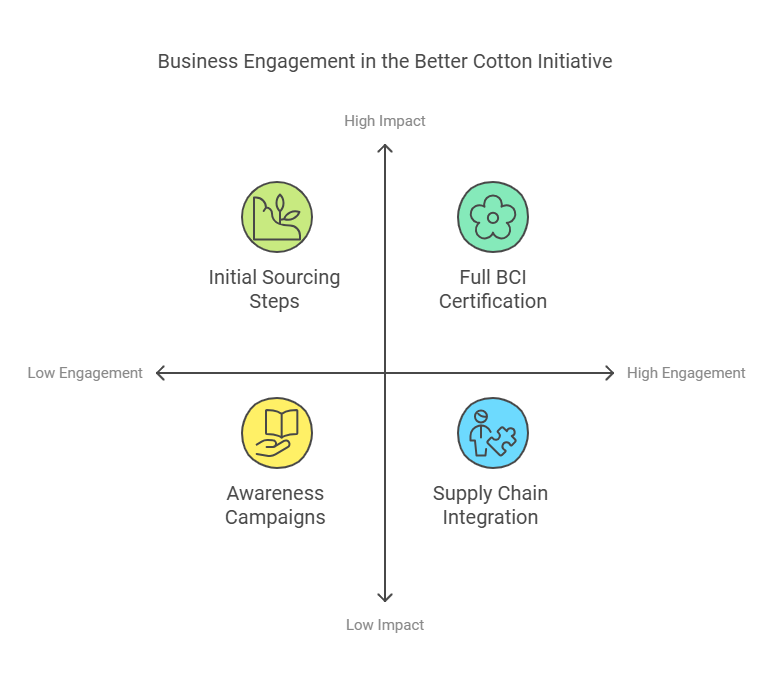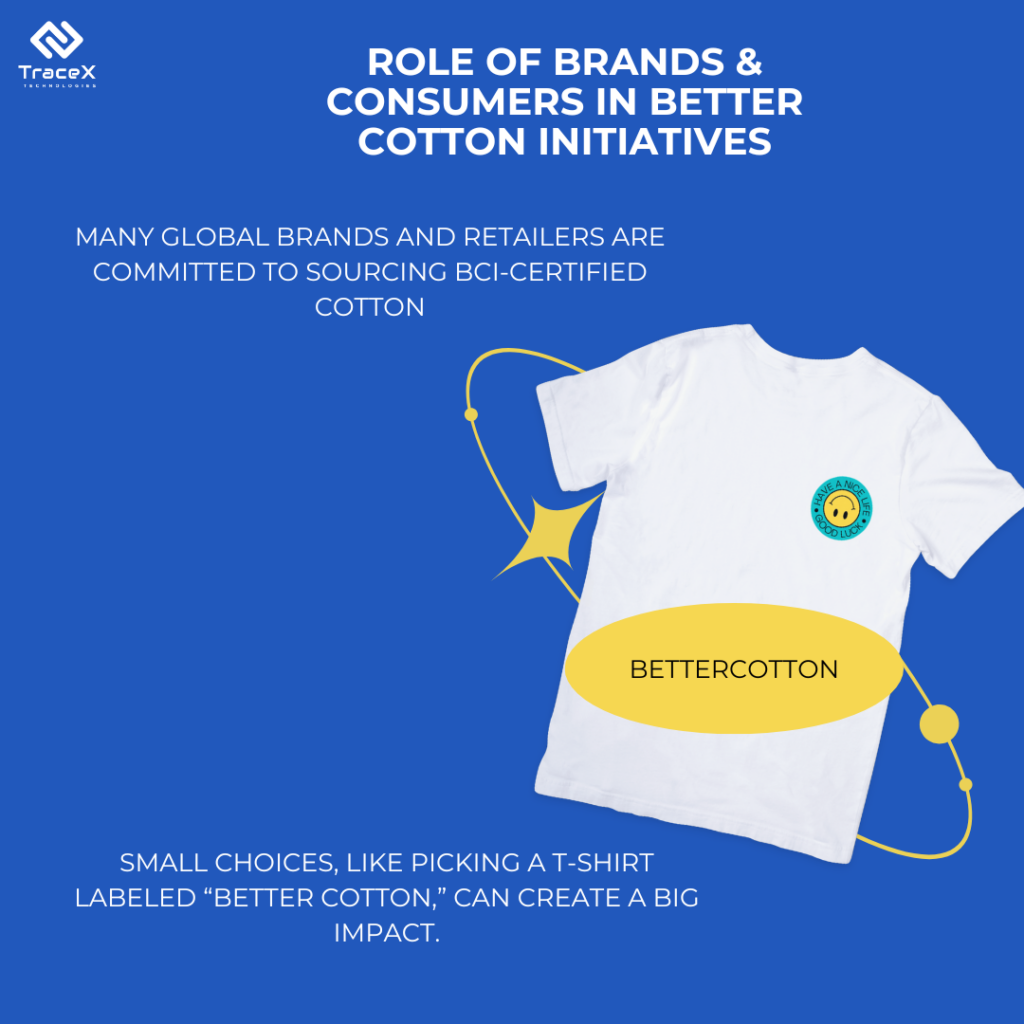Contact: +91 99725 24322 |
Menu
Menu
Quick summary: Discover how the Better Cotton Initiative (BCI) promotes sustainability in cotton farming through responsible practices, farmer support, and a focus on environmental, social, and economic well-being.

The global demand for cotton continues to rise, but the environmental and social challenges associated with traditional cotton farming are becoming impossible to ignore. From excessive water usage to harmful pesticide practices, cotton production has long been a culprit in unsustainable farming. The Better Cotton Initiative—a global movement is aimed at transforming the cotton industry by promoting more sustainable practices.
During the 2022-23 cotton season, BCI reached over 2.8 million farmers across 22 countries, including 2.2 million licensed farmers. These farmers collectively produced 5.4 million tonnes of “Better Cotton,” which accounted for 22% of the global cotton supply.
But while the initiative offers solutions, many cotton producers still face the hurdles of high costs, knowledge gaps, and difficulty accessing sustainable markets. In this blog, we’ll explore how the Better Cotton Initiative addresses these challenges, helping farmers and businesses achieve a more sustainable future while meeting the growing demand for eco-friendly cotton.
Key Takeaways
The Better Cotton Initiative (BCI) is a global program that’s changing the way cotton is grown and sourced. It was created to address the environmental, social, and economic challenges of traditional cotton farming. Essentially, BCI works to make cotton farming more sustainable—not just for the planet, but also for the farmers and communities involved.
Think of it as a movement that’s rethinking how we produce one of the world’s most essential crops. Whether it’s the shirt you’re wearing or the sheets on your bed, BCI aims to ensure that the cotton used in these everyday items is grown in a way that’s better for people and the environment.
At its core, BCI is built on a simple idea: cotton can be grown in a way that minimizes harm and maximizes benefits. To achieve this, the initiative focuses on:
BCI isn’t just about making small improvements—it’s about creating a big impact. Here are some of its primary goals:
The BCI focuses on three main areas of sustainability:
Cotton is often called the “fabric of our lives,” but the way it’s traditionally grown comes with serious challenges for the environment, people, and the economy.
Growing cotton isn’t as simple as planting a seed and watching it grow. Traditional cotton farming has a big environmental footprint.
Cotton farming isn’t just about crops—it’s about the millions of people who grow them. Unfortunately, traditional practices don’t always prioritize farmers’ well-being.
Farming is a business, and for many cotton farmers, the numbers don’t always add up.
Sustainable cotton farming offers a way to tackle these issues. By using water efficiently, adopting natural pest control methods, and improving soil health, farmers can reduce their environmental footprint. Socially, better practices ensure fair wages, safe working conditions, and a brighter future for farming communities. Economically, sustainability helps farmers lower costs, improve yields, and secure better prices for their cotton.
By addressing these challenges head-on, we can create a cotton industry that’s not only productive but also responsible, ensuring a healthier planet and better lives for the people who make it all possible.
The Better Cotton Initiative (BCI) is not just a program—it’s a game-changer for cotton farming. By focusing on sustainability, BCI is helping farmers, communities, and the planet thrive.
Traditional cotton farming often puts a strain on the environment, but BCI is showing that it doesn’t have to be this way.
These efforts are helping farmers grow cotton more sustainably, leaving a smaller environmental footprint.
Behind every cotton bale are hardworking farmers and workers. BCI ensures they’re treated fairly and given the resources they need to succeed.
This human-centered approach is creating stronger, more resilient farming communities.
Sustainability isn’t just about doing what’s right—it’s also about making farming economically viable for those who rely on it.
The Better Cotton Initiative is paving the way for a more responsible cotton industry. It’s helping farmers grow better cotton, not just in quality but also in sustainability. By reducing environmental harm, supporting communities, and creating economic opportunities, BCI ensures that cotton farming can meet the needs of today without compromising the future.

The Better Cotton Initiative (BCI) isn’t just about promoting sustainability—it’s about ensuring that everyone in the cotton supply chain follows a clear and meaningful set of standards. From farmers to retailers, BCI certification ties them all together under the shared goal of making cotton farming better for the planet, people, and profits
The BCI has developed a set of principles and criteria to guide farmers in growing cotton sustainably. These standards focus on three main areas:
Achieving BCI certification isn’t just about following the rules—it’s about transforming how cotton is grown and sold. Here’s how the process works:
The certification process ensures transparency and accountability, making it easier for brands and consumers to trust that they’re supporting sustainable farming.

Technology plays a vital role in transforming the vision of the Better Cotton Initiative (BCI) into reality. By integrating digital tools and platforms, BCI programs can enhance their efficiency, transparency, and scalability.
Technology helps track cotton from the farm to the final product, ensuring that BCI-certified cotton is not mixed with conventional cotton. Blockchain-based traceability platforms, for instance, create immutable records of each transaction in the supply chain, ensuring transparency and authenticity.
TraceX’s blockchain traceability solutions revolutionized the rose value chain for a bio-nutraceutical partner, ensuring end-to-end transparency and accountability. By enabling precise tracking of sourcing and production processes, the solution strengthened socio-economic sustainability, empowered farmers with better practices, and aligned the supply chain with ethical and sustainable standards.
Farmers participating in BCI programs often need to provide data on water usage, pesticide application, soil health, and more. Technology simplifies this process through mobile apps, IoT sensors, and cloud platforms.
Precision agriculture tools like drones, remote sensing, and satellite imagery enable farmers to monitor crop health, water stress, and pest outbreaks with pinpoint accuracy.
Digital platforms facilitate better market access for BCI-certified farmers by linking them with brands and retailers looking for sustainable cotton. These platforms also help farmers get fair prices by providing transparency in transactions.
TraceX platforms provide innovative solutions that align perfectly with the goals of the Better Cotton Initiative (BCI), enabling agribusinesses and farmers to adopt sustainable practices and build transparent, accountable supply chains.
TraceX’s blockchain-powered traceability platform ensures that every step in the cotton supply chain is transparent and tamper-proof. From farm to retailer, TraceX tracks cotton to ensure BCI-certified produce is segregated and authenticated.
TraceX solutions streamline data capture from farmers, supply chain participants, and processing units. This data includes information on water usage, pesticide application, and labor practices.
With farm management tools integrated into its platform, TraceX empowers farmers to adopt sustainable farming practices.
TraceX provides brands and retailers with a robust sustainability platform to validate their sustainability claims. The platform ensures that cotton sourced complies with BCI standards and is ethically produced.
The Better Cotton Initiative is more than a certification; it’s a movement toward a sustainable future for cotton farming. By promoting responsible practices, supporting farmers, and ensuring environmental, social, and economic sustainability, BCI sets the benchmark for sustainable cotton production. As stakeholders across the supply chain—from farmers to retailers—adopt BCI principles, the industry takes a significant step toward balancing profitability with planetary health. The journey to sustainable cotton farming begins with actionable steps, and embracing initiatives like BCI can lead the way.
BCI is a global program aimed at promoting sustainable cotton farming practices by reducing environmental impact, ensuring fair labor conditions, and improving farmer livelihoods.
BCI focuses on minimizing water usage, reducing chemical inputs, enhancing soil health, ensuring ethical labor practices, and increasing farmer incomes through sustainable methods.
Businesses can source BCI-certified cotton for their products, partner with BCI to support sustainable farming, and educate consumers about the benefits of choosing sustainable cotton.
